Bolte Chai
An Android Mobile Application to Support Verbally Challenged ASD Children

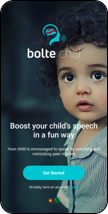
‘Bolte Chai’ is an Android mobile application developed for verbally challenged ASD children. Considering the customization capability, the android application is divisible into two different modes offering both Bangla and English language.
Video
Specifications
- Cloud based framework and database
- Intelligent integrated collaborative platform for children with disabilities their parents,teachers and speech language therapists
- Intelligent analytic system to monitor children progress
- Bangla and English language support
- All the key features of bolte chai lite with minimal subscription fee
- Simplistic user interface
- Implementation or picture exchange communication system (PECS) based speech generating device (SGD) type AAC technology
- Free of cost user experience
Interface
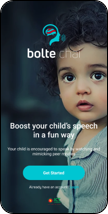
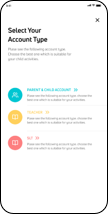
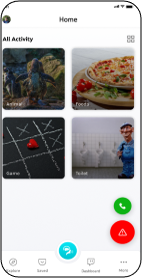

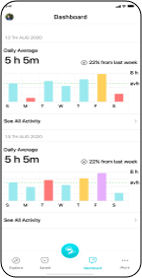
Publications
Khan, Md Nasfikur R., et al. "Bolte Chai: An augmentative and alternative communication device for enhancing communication for nonverbal children." 2016 International Conference on Medical Engineering, Health Informatics and Technology (MediTec). IEEE, 2016. 2016 International Conference on Medical Engineering, Health Informatics and Technology (MediTec) DOI: 10.1109/MEDITEC.2016.7835391 Date of Conference: 17-18 Dec. 2016 INSPEC Accession Number: 16622976 Publisher: IEEE Institute of Electrical and Electronics Engineers Conference Location: Dhaka, Bangladesh
Abstract
There are different kinds of technologies being used to improve the communication opportunity of children with verbal challenges. Portable communication devices provide the facility to the users for customizing applications according to their needs. Besides, the usability and costing range of these portable communication devices make them less condemning for the users. On the other hand, communication devices efficiently help the users with less motor skills. After considering these points, a communication device named “Bolte Chai”, has been developed and experimented in a special school’s students and teachers based on five criteria to evaluate usability and effectiveness. Those criteria are, the ability to customize the program to fit the needs of the users, motor skills for operating the applications, reasonable time and resources involved in the teaching and utilization procedure, update the system based on current research and proper costing, considering the user’s affordability. Based on the evaluation, it has been seen that this communication device is usable and effective to improve communication skills of nonverbal children.
Khan, Md NM. N. R. Khan, H. H. Sonet, F. Yasmin, S. Yesmin, F. Sarker and K. A. Mamun, "‘Bolte Chai’ — An Android application for verbally challenged children," 2017 4th International Conference on Advances in Electrical Engineering (ICAEE), Dhaka, Bangladesh, 2017, pp. 541-545, doi: 10.1109/ICAEE.2017.8255415. Published in: 2017 4th International Conference on Advances in Electrical Engineering (ICAEE) Date of Conference: 28-30 September 2017 Date Added to IEEE Xplore: 15 January 2018 DOI: 10.1109/ICAEE.2017.8255415 Publisher: IEEE Conference Location: Dhaka, Bangladeshasfikur R., et al. "Bolte Chai: An augmentative and alternative communication device for enhancing communication for nonverbal children." 2016 International Conference on Medical Engineering, Health Informatics and Technology (MediTec). IEEE, 2016. 2016 International Conference on Medical Engineering, Health Informatics and Technology (MediTec) DOI: 10.1109/MEDITEC.2016.7835391 Date of Conference: 17-18 Dec. 2016 INSPEC Accession Number: 16622976 Publisher: IEEE Institute of Electrical and Electronics Engineers Conference Location: Dhaka, Bangladesh
Abstract
Mobile technology has introduced new communication possibilities for patients with verbal challenges. In western countries different kinds of SGD and AAC devices are available to fulfill the communicative needs of users with verbal disabilities. Recently mobile phone applications are also used to fulfill the demand of communication. In developing countries like Bangladesh, mobile phones are much more available, affordable and less stigmatizing for the users of any kind. After considering these points, an android app named “Bolte Chai”, has been developed and an experiment has been performed on verbally challenged students and teachers based on four criteria to evaluate the usability and effectiveness of the application. These criteria are, the ability to customize the application to fit the needs of the users, motor skills for operating the applications, reasonable time and resources involved in the teaching and utilization procedure and proper costing, considering the user's affordability. Overall the application is supposed to be fully customized, more user friendly and effective to improve communication skills for verbally challenged users.
Farzana, Walia, et al. "Communication Support Utilizing AAC for Verbally Challenged Children in Developing Countries During COVID-19 Pandemic." International Conference on Human-Computer Interaction. Springer, Cham, 2020. First Online:08 November 2020 DOI: doi.org/10.1007/978-3-030-60703-6_6 Publisher Name: Springer, Cham Online ISBN: 978-3-030-60703-6 Print ISBN:978-3-030-60702-9
Abstract
Functional communication is indispensable for child development at all times but during this COVID-19, non-verbal children become more anxious about social distancing and self-quarantine due to sudden aberration on daily designed practices and professional support. These verbally challenged children require the support of Augmentative and Alternative Communication (AAC) for intercommunication. Therefore, during COVID-19, assistance must be provided remotely to these users by an AAC team involving caregivers, teachers, Speech Language Therapist (SLT) to ensure collaborative learning and development of non-verbal child communication skills. However, most of the advanced AAC, such as Speech Generating Devices (SGD), Picture Exchange Communication System (PECS) based mobile applications (Android & iOS) are designed considering the scenario of developed countries and less accessible in developing countries. Therefore, in this study, we are focusing on representing feasible short term strategies, prospective challenges and as long term strategy, a cloud based framework entitled as “Bolte Chai+”, which is an intelligent integrated collaborative learning platform for non-verbal children, parents, caregivers, teachers and SLT. The intelligent analytics within the platform monitors child overall progress by tracking child activity in mobile application and conversely support parents and AAC team to concentrate on individual child ubiquitous abilities. We believe the proposed framework and strategies will empower non-verbal children and assist researchers, policy makers to acknowledge a definitive solution to implement AAC as communication support in developing countries during COVID-19 pandemic.
Farzana, Walia, et al. "An Evaluation of Augmentative and Alternative Communication Research for ASD Children in Developing Countries: Benefits and Barriers." International Conference on Human-Computer Interaction. Springer, Cham, 2020. First Online: 08 November 2020 DOI: doi.org/10.1007/978-3-030-60703-6_7 Publisher Name: Springer, Cham Online ISBN 978-3-030-60703-6 Print ISBN 978-3-030-60702-9
Abstract
Augmentative and Alternative Communication (AAC) technology research not only enhances communication but also communal skills in verbally challenged children with Autism Spectrum Disorder (ASD). However, the research on AAC technology is mainly concentrated in developed countries and less explored in developing countries. In this study, we utilized evaluation method to analyze the prospects, existing practices and future possibilities, benefits and barriers of AAC research in developing countries. It is found that Speech Generating Devices(SGD)are mostly preferred by children and in future artificial intelligence(AI)based mobile application will augment communication skills among verbally challenged children.We conclude with general recommendation on succeeding research, collaborative approach and implementation with funding opportunities for substantial growth of AAC technology research in developing countries. This study will facilitate directions for initiating AAC research in developing countries and will accommodate researchers, developers and stakeholders to acknowledge opportunities, barriers, probable and current state of AAC research.
Farzana, Walia, et al. "Technological Evolvement in AAC Modalities to Foster Communications of Verbally Challenged ASD Children: A Systematic Review." IEEE Access (2021). Published in: IEEE Access ( Early Access ) Date of Publication: 28 January 2021 Electronic ISSN: 2169-3536 DOI: 10.1109/ACCESS.2021.3055195 Publisher: IEEE
Abstract
Augmentative and Alternative Communication (AAC) emerged as a combination of methods or strategies that constitute any device, such as Speech Generating Device (SGD), Program (mobile applications), Procedure (PECS, Picture Exchange Communication System), which enhances an individual's communication ability. Autism Spectrum Disorder (ASD) is a spectrum of comprehensive neurodevelopmental disorder that leads to speech impairments, repetitive behavior, and social communication difficulties; therefore, it is imperative to underscore that at the core of all impediments are communication impairment. This article represents a systematic review of research initiatives that investigate multi-modal AAC strategies and functionality, features of mobile applications to reinforce communication and communal skills in verbally challenged ASD children because other researches are focused only on low or high-tech AAC or interventions to provide insights on ASD children respond to a particular approach. Following the PRISMA method, a total of 60 (January 2015 to October 2020) research articles were reviewed, indexed by Springer, Science Direct, Scopus, ACM, IEEE databases, and published in the AAC journal. The selected research articles are categorized into different themes where most of them focused on interactive mobile applications to improve emotional, social, learning, and overall communication skills in verbally challenged ASD children. This systematic review provides an outline of the paradigm shift in AAC modalities from PECS to Artificial Intelligence (AI), Machine Learning (ML), and Augmented Reality (AR) based applications. It opens up underline future opportunities to integrate intelligent analytics features in mobile applications to strengthen communication skills in verbally undermined ASD children.
Partners







